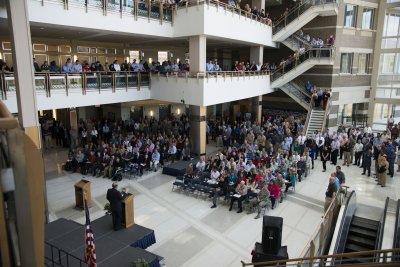
Undersecretary of Defense for Acquisition, Technology and Logistics Frank Kendall speaks to members of the U.S. Navy Naval Air Systems Command workforce at Naval Air Station Patuxent River, Md., March 31, 2015. (U.S. Navy photo by Noel Hepp)
NAVAL AIR STATION PATUXENT RIVER, Md., April 1, 2015 – The Defense Department's top acquisition official yesterday made his third visit to Naval Air Station Patuxent River, Maryland, home to U.S. Navy Naval Air Systems Command, or NAVAIR.
Undersecretary of Defense for Acquisition, Logistics and Technology Frank Kendall spoke to members of the base’s civilian and military workforce, many of whom conduct acquisition, testing and development work for several next-generation aircraft and weapons systems, including the Navy and Marine Corps variants of the F-35 Lightning II joint strike fighter and the MQ-4C Triton unmanned aerial vehicle.
Kendall outlined the importance of developing the next generation of engineers, scientists and acquisition professionals to ensuring that the nation maintains its technological superiority.
Workforce Development
"Science, technology and math education ... I think is hugely important to the future of the country, not just the Department of Defense," he said. "I'm encouraging people to be engaged in that world and do whatever you can to encourage young people to go into science, engineering and math because of the service they can provide to society, and because it's fun."
Kendall said the single-most important decision in his career was one he made in junior high school, when he elected to take honors math and science instead of honors English and history. That decision put him on a technical track that he's stayed on ever since, the undersecretary said.
Mid-career professionals in the defense workforce are outnumbered on either side by the very capable senior professionals who are close to retirement and personnel just starting their careers, Kendall said.
"We've really got a challenge to transfer the knowledge from those senior people to those younger people and develop them as quickly as possible," he said. "I'm a big fan of exchanges with industry ... [and] developmental assignments for people. I think you get an awful lot out of that. You can learn a great deal in a year or even six months in a different environment."
To do this, the department is investigating adding flexibility to its hiring authorities, Kendall said. Defense Secretary Ash Carter also wants to attract young workers from fields that don't traditionally join the defense department, particularly tech workers, he said.
Technological Superiority
The quest to maintain American technological superiority is the driving force behind the third Better Buying Power initiative, the undersecretary said.
Kendall said that when he returned to government after a stint in private industry it became apparent that there were "some people out there who were challenging our technological superiority, and they're doing it very effectively." These challengers are making smart investments, particularly in anti-access/area-denial capabilities, he said.
The first Gulf War was a "dramatic demonstration of [U.S.] military power," the undersecretary said. No one was watching those events more carefully than the Chinese, Kendall noted, and the Russians weren't far behind. But, he said, "People have had over 20 years now to watch and learn from how the U.S. organizes, equips and fights."
Better Buying Power 3.0
The three versions of Better Buying Power should be considered three legs of the same stool, Kendall said. "The third edition of Better Buying Power ... is much more continuity than change," he added.
The emphasis of the first Better Buying Power was on efficiency and productivity, BBP 2.0 emphasized the importance of professionalism, the undersecretary said, and BBP 3.0 focuses on technical excellence and innovation.
"A lot of the things from the earlier versions we're still going to do, some of them I regard as core parts of Better Buying Power," Kendall said, noting that NAVAIR and other agencies have embraced these principles and are making significant progress toward achieving them.
Cybersecurity
One addition to BBP 3.0 is an emphasis on cybersecurity, the undersecretary said. "If we're giving away our designs we're giving up whatever advantage that they give to us. We're giving up money and we're giving up time and we're giving up capability," he said.
The nation's civilian and military networks are under cyberattack every day, Kendall said.
"We have lost, in particular, a lot of unclassified technical information through, basically, cyber espionage and we have paid a price for that," the undersecretary said. "We have paid a price in terms of technical lead and in terms of cost differentials that we were able to achieve. We have got to do a better job than this."
Cybersecurity is "a constant problem" in every phase of the acquisition and fielding process—from design to production to deployment—he said. Giving the problem the attention it needs will cost the nation some money, Kendall said, "but if we don't do it we're going to have new problems and we're going to find out about those problems at a very inconvenient time."


